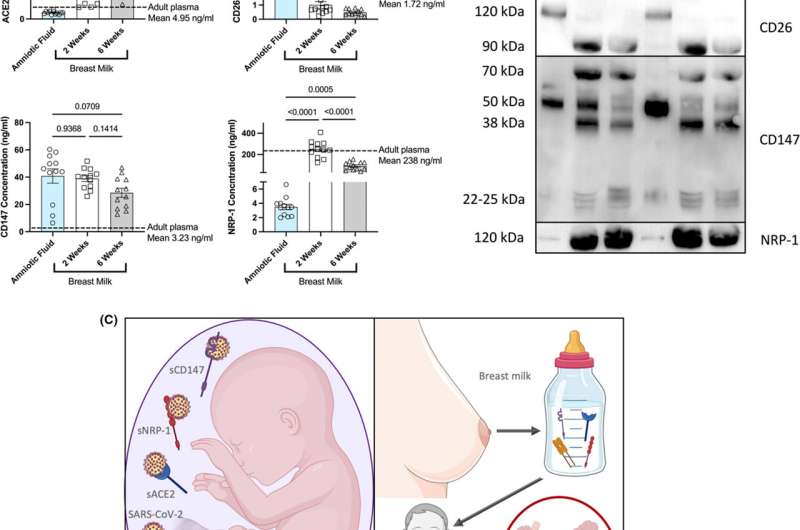Possible protective impact of breast milk and amniotic fluid on coronavirus variant in pregnant women and newborns

New collaborative research from Swansea University and the University of Aberdeen has identified potential protective effects in breast milk and amniotic fluid against SARS-CoV-2. The study was published in Pediatric Allergy and Immunology.
ACE2, CD26, CD147 and NRP1 are membrane-bound receptors that facilitate SARS-Cov-2 entry into the cell.
Previous studies have suggested that soluble forms of the ACE2 protein may act as decoys, trapping the virus in biological fluids and preventing it from infecting cells.
Using breast milk and amniotic fluid donated by women pre-COVID and archived, the study measured the presence of these soluble receptors and found a high concentration.
After imaging the proteins, the team discovered that these receptors have different isoforms, the same molecule but varying lengths.
The rich presence of these soluble receptors in breast milk and amniotic fluid may act as decoy receptors. It could help explain the low chance of infection and severity of the virus in fetuses and babies.
April Rees, a Swansea University Ph.D. student and Biochemistry Tutor, said: "It has been a peculiar finding that babies before and after birth are relatively protected from SARS-CoV-2. Our findings here may shed some light on why that is.
"It adds to the argument that breastfeeding is more beneficial, and so assistance in helping mothers breastfeed is vital."
Professor Stephen Turner, a consultant pediatrician at Royal Aberdeen Children's Hospital and Honorary Professor at the University of Aberdeen, said: "There is a long list of good reasons why mothers should breastfeed their baby wherever possible, and protecting baby against COVID-19 could now be added to the list. Pregnant mothers can also protect themselves, and baby, by having the COVID-19 vaccine."
Understanding the process of this resilience against severe COVID-19 in pregnant women and newborns could be critical to ensuring ongoing vigilance in care and provide an insight into its possible effectiveness against other viral infections.
The research team hopes to isolate the various isoforms to identify which is more optimal for binding the virus, evaluating whether breast milk and amniotic fluid inhibit viral entry into cells.
More information: April Rees et al, Potential protective effects of breast milk and amniotic fluid against novel coronavirus SARS‐CoV‐2 through decoy receptors, Pediatric Allergy and Immunology (2021). DOI: 10.1111/pai.13672





















